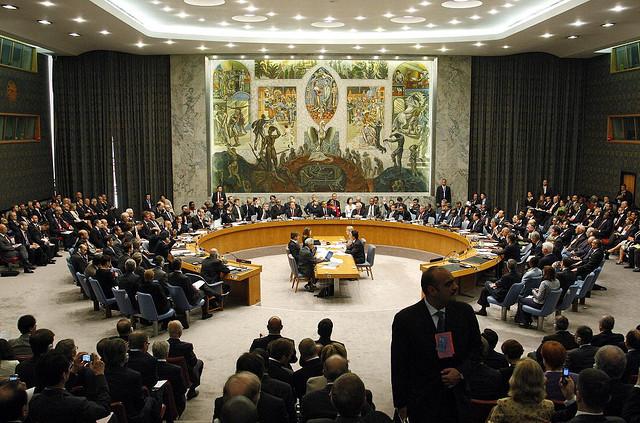 Tony Abbott arrived in New York overnight to commence the US leg of his latest overseas trip. While it’s anticipated this portion of the trip will have a heavy business, trade and investment focus, it’s also expected that time will be made for Prime Minister Abbott to make his first courtesy call on the UN Secretary-General, Ban Ki-moon.
Tony Abbott arrived in New York overnight to commence the US leg of his latest overseas trip. While it’s anticipated this portion of the trip will have a heavy business, trade and investment focus, it’s also expected that time will be made for Prime Minister Abbott to make his first courtesy call on the UN Secretary-General, Ban Ki-moon.
It’s notable that Abbott’s meeting with Ban Ki-moon will take place against that trade and investment backdrop. Julie Bishop’s speech to the UN General Assembly in September 2013 occurred in a similar setting. Having been Foreign Minister for only nine days at that point, Bishop’s statement focused almost exclusively on the ability of economic growth and trade to foster sustainable development, or the importance of ‘aid for trade’ (as previously noted here).
The government’s current focus on economic diplomacy and forthcoming reductions in Australia’s aid program could be one of several subjects to emerge in discussion (along with others that have drawn criticism, including Australia’s asylum seeker policies). But, such sensitive subjects and differences are unlikely to be the principal focus of Abbott’s meeting later today. And if they are, Abbott would be better off refocusing the discussion to areas where Australian engagement with the UN has recently been more consistent, namely, support of the organisation’s efforts to maintain peace and security efforts.
To assist in such efforts, one of the topics under discussion might be how Australia can best leverage its final six months as a non-permanent member of the UN Security Council. Although the Coalition didn’t support Australia’s bid for the seat for 2013-14, it quickly adjusted to Australia’s new-found responsibilities when it came into government during our first Presidency of the Council in September 2013. During that month, Julie Bishop presided over a Council debate that adopted the UN’s first-ever resolution on small arms and light weapons, resolution 2117 (PDF). The adoption of the resolution built on Australia’s existing engagement as one of the co-authors of the Arms Trade Treaty (Australia ratified the treaty last week). Both initiatives will need the operational support of countries to ensure they’re implemented and complied with.
The situation in Syria is one critical and high profile area of mutual concern where Australia has been working to support the UN’s humanitarian efforts. This has included engagement with other non-permanent Council members Jordan and Luxembourg to improve humanitarian access to parts of the country. The adoption of Resolution 2139 (PDF) in February (co-authored by Australia, Jordan and Luxembourg) was an important step forward, but it’s had limited effect alleviating the suffering of the civilian population in the absence of stricter enforcement mechanisms.
Given Australia’s investment in those efforts to date on the Security Council, as well as our ongoing support to humanitarian assistance in Syria, it’s in our interests to continue supporting mechanisms that may assist the UN to deliver humanitarian assistance on the ground in Syria.
Similarly, Australia’s significant engagement politically and militarily in Afghanistan over the last decade means we have a direct interest in the UN’s future engagement in the country, something we’ve supported as the ‘pen-holder’ (lead) for Afghanistan on the Council during our current term.
The Security Council’s recent approval of sanctions against Boko Haram (as an al-Qaeda affiliate) demonstrate that sanctions remain an important mechanism to respond to challenges to international security. Australia currently chairs three of the UN Security Council’s sanctions committees, including the ‘1267 committee’ on Al Qaeda. As sanctions remain increasingly relevant to the UN’s efforts to respond to challenges to peace and security, Australia’s efforts to approach more comprehensively the UN’s engagement on sanctions as part of the remainder of our Council term could benefit from further exploration
While Australia’s engagement on the UN Security Council provides political clout on peace and security issues, the meeting between Abbott and Ban Ki-moon will also provide an opportunity for the UN to send messages about areas where it requires operational support. Though the ADF and AFP have remained constant contributors of personnel to UN peacekeeping efforts for more than 50 years, there’s an expectation that Australia—like other Western countries—may have a greater capacity to contribute further to these efforts after drawdowns in Afghanistan. Given the value attained from the air lift support that the ADF provided in South Sudan in December last year, it’s a topic that will no doubt be of interest to the UN.
Abbott’s first official UN engagement since coming to office will provide an opportunity to elaborate further on Australia’s priorities for multilateral engagement beyond the ‘more Jakarta, less Geneva’ slogan of last year’s election campaign. Such elaboration would give important guidance as to how we best spend the remaining time of our existing term on the Security Council, which will include a further turn at the Presidency in November. It’s an important and worthwhile meeting as part of Abbott’s first visit to New York as Prime Minister.
Lisa Sharland is an analyst at ASPI. Image courtesy of the United Nations.